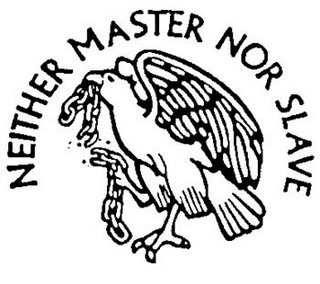 What is often forgotten about Martin Luther King was that he was the voice the working class in America, black and white. Which is what the conservatives in the United States will never fogive him for.
What is often forgotten about Martin Luther King was that he was the voice the working class in America, black and white. Which is what the conservatives in the United States will never fogive him for.
"In our glorious fight for civil rights, we must guard against being fooled by false slogans, as 'right-to-work.' It provides no 'rights' and no 'works.' Its purpose is to destroy labor unions and the freedom of collective bargaining... We demand this fraud be stopped." Martin Luther King
Negroes are almost entirely a working people. There are pitifully few Negro millionaires, and few Negro employers. Our needs are identical with labor's needs — decent wages, fair working conditions, livable housing, old age security, health and welfare measures, conditions in which families can grow, have education for their children and respect in the community. That is why Negroes support labor's demands and fight laws which curb labor. That is why the labor-hater and labor-baiter is virtually always a twin-headed creature spewing anti-Negro epithets from one mouth and anti-labor propaganda from the other mouth. Martin Luther King
Martin Luther King Jr. was in Memphis, Tennessee, the day he died to support a strike by the city’s sanitation workers. The garbage men there–almost all of them black–had recently formed a chapter of the American Federation of State, County and Municipal Employees to demand better wages and working conditions. But the city refused to recognize their union, and when the 1,300 employees walked off their jobs, marching under picket signs reading "I Am a Man", the police broke up the rally with mace and billy clubs. After the mayor threatened to fire every one of the striking workers and a local court issued an injunction against any further demonstrations, the union’s leaders called on Dr. King to visit Memphis.
 King’s famous "I Have a Dream" speech on the steps of the Lincoln Memorial. The soaring oratory was heard by millions. But if King’s voice carried that day, it was no thanks to his corporate sponsors, for he had none. Rather, the thanks went largely to the United Auto Workers, the union that supplied the microphones and paid for the electricity, funding most of the logistics of the march. Walter Reuther, the head of the auto workers’ union, was on the platform along with King and the real instigators of the march. For although King was the final speaker on the rostrum, he was not the chief organizer of that massing of humanity. The March on Washington for Jobs and Freedom, as it was officially called, was largely the brainchild of the labor leader A. Philip Randolph.
King’s famous "I Have a Dream" speech on the steps of the Lincoln Memorial. The soaring oratory was heard by millions. But if King’s voice carried that day, it was no thanks to his corporate sponsors, for he had none. Rather, the thanks went largely to the United Auto Workers, the union that supplied the microphones and paid for the electricity, funding most of the logistics of the march. Walter Reuther, the head of the auto workers’ union, was on the platform along with King and the real instigators of the march. For although King was the final speaker on the rostrum, he was not the chief organizer of that massing of humanity. The March on Washington for Jobs and Freedom, as it was officially called, was largely the brainchild of the labor leader A. Philip Randolph.In their effort to lay claim to King, much as generations of politicians strove to “get right with Lincoln,” conservatives have presented an ahistorical portrait of him as an absolutist on the question of race and public policy. By their estimation, King’s “I have a dream” speech should be taken literally: He espoused a civic order where governments made no distinctions between citizens based on race. Hence he would have opposed compensatory set-asides, quotas, or timelines and targets aimed at redistributing jobs and economic resources.
The problem with this version of history is that it ignores much of what King said. In his book Why We Can’t Wait, he wrote that “no amount of gold could provide an adequate compensation for the exploitation and humiliation of the Negro in America down through the centuries. Not all the wealth of this affluent society could meet the bill. Yet a price can be placed on unpaid wages. The ancient common law has always provided a remedy for the appropriation of the labor of one human being by another. . . . The payment should be in the form of a massive program by the government of special, compensatory measures which could be regarded as a settlement in accordance with the accepted practice of common law. . . . I am proposing, therefore, that, just as we granted a GI Bill of Rights to war veterans, America launch a broad-based and gigantic Bill of Rights for the Disadvantaged, our veterans of the long siege of denial.”
Critically, he envisioned these broad-based, public-sector compensatory programs as targeting both African-Americans and poor whites, whom he labeled the “derivative victims” of slavery and Jim Crow. In this regard he leaned on the writings of W. E. B. Du Bois, who famously observed that poor and working-class whites gained nothing from Jim Crow but the psychological “wages of whiteness.” In return for the psychological boost that “whiteness” gave them, poor whites—millions of them, from slavery times through the modern age—surrendered political and economic power to their elite counterparts. King might well have been thinking of the radical white writer Lillian Smith’s 1943 parable, “Two Men and a Bargain,” in which “Once a time, down South, Mr. Rich White made a bargain with Mr. Poor White. . . . You boss the nigger, and I’ll boss the money.” According to Smith, they “segregated southern money from Mr. Poor White and they . . . segregated the Negro from everything.”
Smith’s reasoning—and King’s—was well-founded. Jim Crow divided white and black labor against each other, stunting the growth of unions, labor parties, and liberal political coalitions. Jim Crow thus drove down wages across the board and secured a political system (chiefly in the American South) where taxes were regressive, public services were minimal, and political participation was sharply limited. Remember that on the eve of World War II, poll taxes in eight Southern states disenfranchised as many as 64 percent of white citizens and virtually all eligible black voters. It’s hard to say what most working-class whites got from Jim Crow other than the satisfaction that they weren’t black.
See:
Working Class
Afro-Americans
Find blog posts, photos, events and more off-site about:
labour, labor, black, white, workers, unions, working class, America, Martin Luther King, MLK, Martin Luther King Day, AFL/CIO, A. Phillip Randolph, W E B Dubois, Afro-Americans




